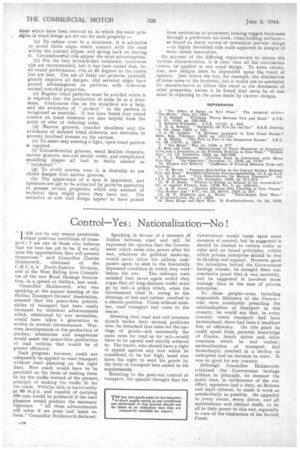Control—Yes: Nationalization—No !
Page 30

If you've noticed an error in this article please click here to report it so we can fix it.
" f AM not by any means pessimistic 1 about post-war conditions of transport: I am one of those who believes that the best has yet to be, if we only seize the opportunities that will present themselves," said Councillor Charles Holdsworth, chairman of the C.M.U.A.'s North-Eastern Division, and of the West Riding Area Committee of the new Road Haulage Association, in a speech at Halifax, last week.
Councillor Holdsworth, who Was speaking at the annual meeting of the Halifax Transport Owners' Association, stressed .that the peace-time potentialities of transport had been vastly increased by technical advancements which, stimulated by war necessities, would have taken a generation to evolve in normal circumstances. Wartime developments in the production of plastics, aluminium and magnesium would assist the peace-time production of road vehicles that would be of greater efficiency.
Such progress, however, could not adequately be applied to road transport without road planning on the right lines. New roads would have to be provided on the basis of making them fit for the traffic instead of the present, principle of making the traffic fit for the roads. Vehicles able to travel safely at 60 m.p.h. and capable of carrying 100 tons would be produced if the road planners would produce the necessary highways. "All these advancements will come if we press 'and insist on them," Councillor Holdsworth declared. Speaking in favour of a measure of liaison between road and rail, he expressed the opinion that the Government which came into power after the war, whatever its political make-up,, would never allow the railway companies again to sink to the financially depressed condition in which they were •
before the war. The railways were satisfied that never again would they argue that all long-distance traffic must go by rail—a policy which, when the Government tried it, owing to the shortage of fuel and rubber, resulted in a chaotic position. Times. without number, road transport had come to the rescue.
Stressing that road and rail interests should tackle their mutual problems now, he remarked that rates for the carriage of goods—not necessarily the same rates for road as for rail—would have to be agreed and strictly adhered to. The trader, who should have a right of appeal against any rate which he considered to be too high, 'must also havethe right to send his goods by the form of transport best snited to his requirements.
Referring to the post-war control of transport, the speaker thought that the
Government would insist upon some measure of control, but he suggested it should be limited to certain codes or rules and on broad principles, within which private enterprise should be free to 'develop and expand. However good the intentions behind the Governtnenv haulage scheme, he thought there was conclusive proof that it was unwieldy, and he suggested it involved more wastage than in the case of private enterprise.
To those people—even including responsible Ministers of the Crown— who were constantly preaching the nationalization of transport in this country, he would say that, in every country where transport • had been nationalized, there had been a resultant
loss of efficiency. On this point he could speak from personal knowledge of France, South Africa and other countries which he had visited; nationalization of transport had immediatply resulted in a decline in enterprise and an increase in costs. It was no good for any country.
Although Councillor Holdsworth criticized the Government haulage scheme in Principle, he stressed the point that, in furtherance of the war effort, operators had a duty, es Britons and loyal citizens, to make it work as satisfactorily as possible. He appealed to every owner, every driver, and all maintenance and clerical staffs, to do all in their power to this end, especially in. view of the imminence of the Second Front.




















































